How World Vision is preparing climate smart children in Mahottari through Eco-School
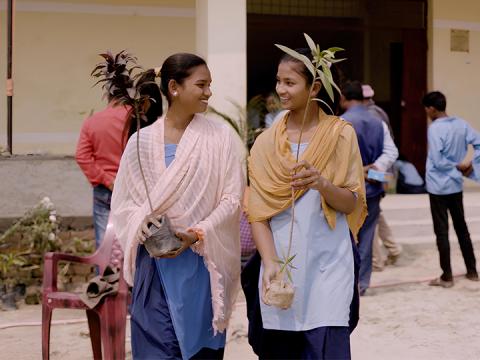
In Nepal, the National Census 2078 BS reveals a literacy rate of 76.3% for the population aged five years and above, with males at 83.6% and females at 69.4%. However, in Mahottari district, the picture is starkly different, with a literacy rate of only 47%, falling significantly below both national and provincial averages.
Within Mahottari, Ekdara Rural Municipality (RM) is home to predominantly marginalized communities, including Muslims (20%), Yadav (18%), and Dhanuk (14%). Government statistics paint a concerning reality: over half (54%) of the population above 18 years in Ekdara RM is illiterate, with female illiteracy reaching 63%. Fewer than one-tenth of adults (9%) have completed secondary-level education. The educational landscape for children in Ekdara RM involves 8,442 students (3,967 boys; 4,475 girls) taught by 89 teachers across 12 schools and 12 Early Childhood Care and Development (ECCD) Centers. These schools face numerous challenges, including inadequate infrastructure, poor seating, broken furniture, a severe lack of greenery, and an absence of appropriate child-friendly spaces. These critical issues demanded immediate attention. Compounding this, parents are often preoccupied with earning a livelihood, leading to less concern about their children’s learning in school. This highlights a crucial need for the reform and reactivation of parent-teacher interactions and the School Management Committee (SMC) structure.
A Vision for Change: The Eco-School Project
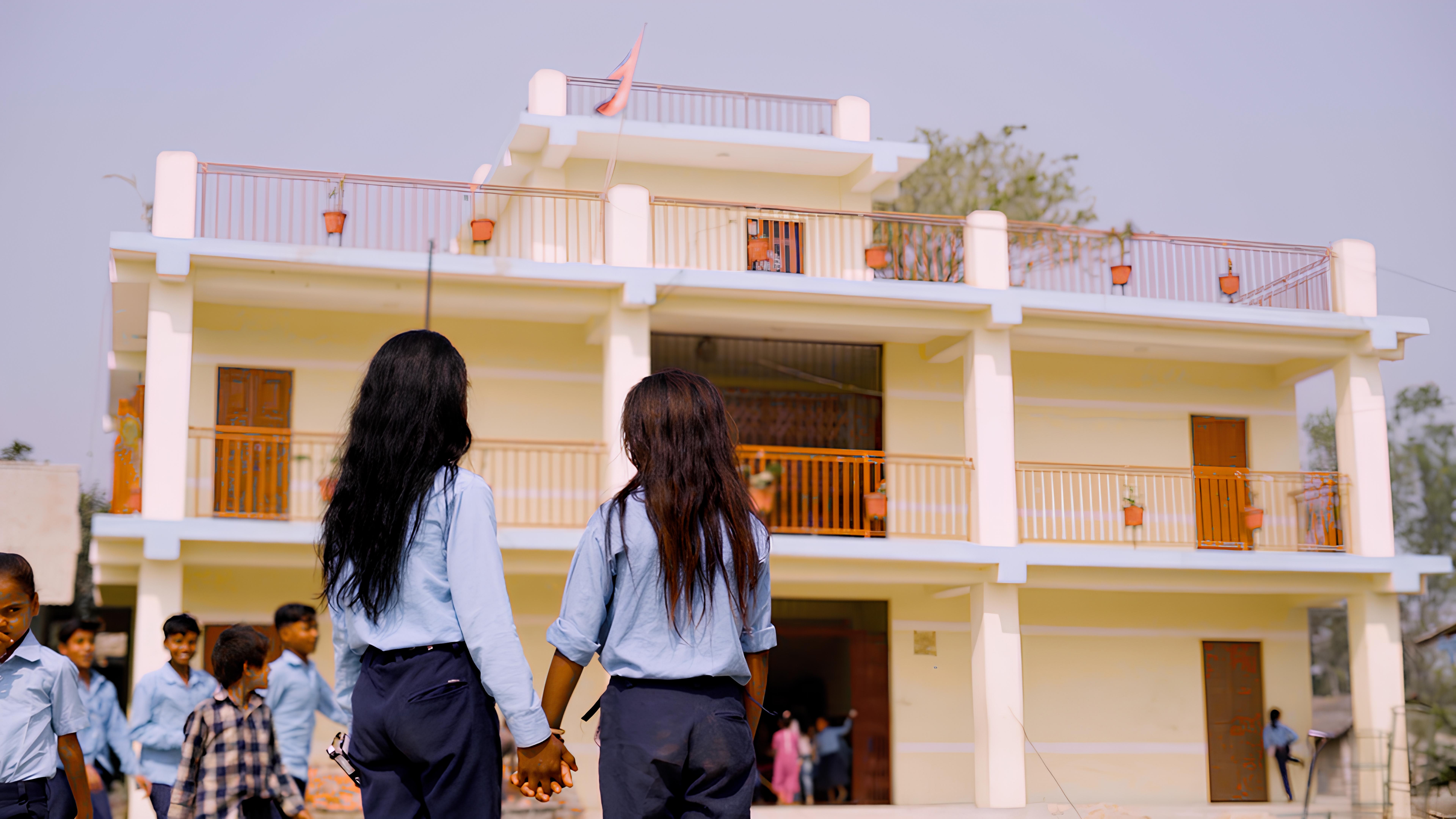
In response to these pressing needs, the Eco-School Project was initiated to contribute to World Vision International Nepal’s Country Strategy (2021–2025). This strategy aims to improve the well-being of 0.8 million children, especially the most vulnerable, by ensuring they are protected from violence, well-nourished, have access to quality and inclusive education, and experience positive and peaceful relationships within their families and communities.
Following extensive consultations with local government, school visits, and interactions with school management committees and community leaders, Shree Rastriya Basic School in Ekdara Rural Municipality Ward No. 4 was identified as particularly vulnerable. The school suffered from inadequate and unsafe infrastructure that severely impacted a large proportion of its students. Despite having four buildings, only three were in use, and two of these were deemed unsafe due to damaged walls, roofs, windows, flooring, seating arrangements, and overall structural issues. The unsafe environment and lack of quality teaching and learning services negatively affected both learning outcomes and student enrollment.
The Eco-School Project was designed to directly address these issues by creating climate- and child-friendly environments and classrooms. It incorporates elements of the Unlock Literacy (UL) approach to foster an inclusive and high-quality educational setting for all children. The project also aims to promote eco-friendly learning experiences and cleaner surroundings, thereby contributing to a safer and more enriching learning environment in the long term. Aligned with the Government of Nepal's long-term commitment through the School Sector Education Plan (SESP 2022–2032), World Vision implemented the Eco-School Project in 2024 and 2025. Its core objective was to increase access to quality basic education for the most vulnerable and marginalized children, supporting their right to education. Specifically, the project focused on improving the learning performance of children in early grades (Grades 1 to 3) by creating enabling classroom conditions and developing child-friendly and climate-smart physical infrastructure. Furthermore, it strengthened the capacity of the local government and supported the formulation of eco-school policies to promote climate-smart schools at the outcome level.
From Vision to Reality: Project Interventions
The overarching goal of the Eco-School Project was to increase children's access to inclusive and quality basic education. The project effectively supported and enhanced literacy activities for early-grade children. Key initiatives included establishing community-based reading structures, promoting parental engagement, providing teacher training, and developing teaching and learning materials (TLM), all contributing to a joyful and enabling learning environment for young students.
These interventions significantly improved the teaching environment. Four trained early-grade teachers are now effectively applying child-friendly teaching methods in the classroom. Beyond teaching, the project successfully constructed and handed over child-friendly and disability-friendly school infrastructure. This comprehensive upgrade included a new four-classroom inclusive school building, a gender- and disability-friendly toilet and handwashing station, and a 119-meter-long compound wall with pathways. Additionally, two existing classrooms underwent renovation and were upgraded to be climate-friendly. A notable innovation was the use of plastic polyfloss insulation in the classroom ceilings, which has helped mitigate extreme weather conditions like heat, cold, and noise during the monsoon season.
Barsha, a Grade 8 student, shared the tangible impact: “During the monsoon, the sound of rain was so disruptive that we could not understand our teacher’s lessons. Additionally, the classroom became unbearably hot in the summer and too cold in the winter. After installing plastic polyfloss on the ceiling, these issues have been somewhat reduced, and now the rain no longer disrupts our class”.
The project also actively promoted green school initiatives through the formation of a school-level Eco Club, plantation activities, and gardening. A 13-member Eco Club was established, with members receiving training on club operations and waste management. These young environmentalists are now actively engaged in various school and community-level awareness activities, including quiz and debate competitions, awareness rallies, and environmental efforts like planting and gardening. Through effective collaboration and coordination with the local government, the project supported Ekdara Rural Municipality in developing and endorsing the "Green School Program Implementation Procedure 2082". This crucial policy formulation was achieved through thorough policy discussions and several meetings.
Tangible Results: A Brighter Educational Landscape
The efforts have yielded significant improvements in access to inclusive and quality education for children at the school. The renovation of classrooms and the installation of Water, Sanitation, and Hygiene (WASH) facilities have created safe and child-friendly spaces that foster an enjoyable learning environment. Early-grade children, who once struggled with uncomfortable desks and benches, now benefit from improved seating arrangements, enhancing their classroom experience. The plastic polyfloss-insulated ceilings in renovated classrooms have helped the school adapt to the effects of climate change, reducing heat in summer, cold in winter, and noise during the rainy season, thus ensuring a more comfortable learning environment year-round.
Ram Ishwar, the headteacher, highlighted the transformative impact: “The classrooms were inadequate, and they looked deserted, which is why the students didn’t show much interest in attending school. However, the Eco-School Project has transformed the school environment, creating an enabling space where children learn joyfully and regularly participate in classes. The reading skills of early-grade children have also increased due to the support provided by a community-based reading camp”.
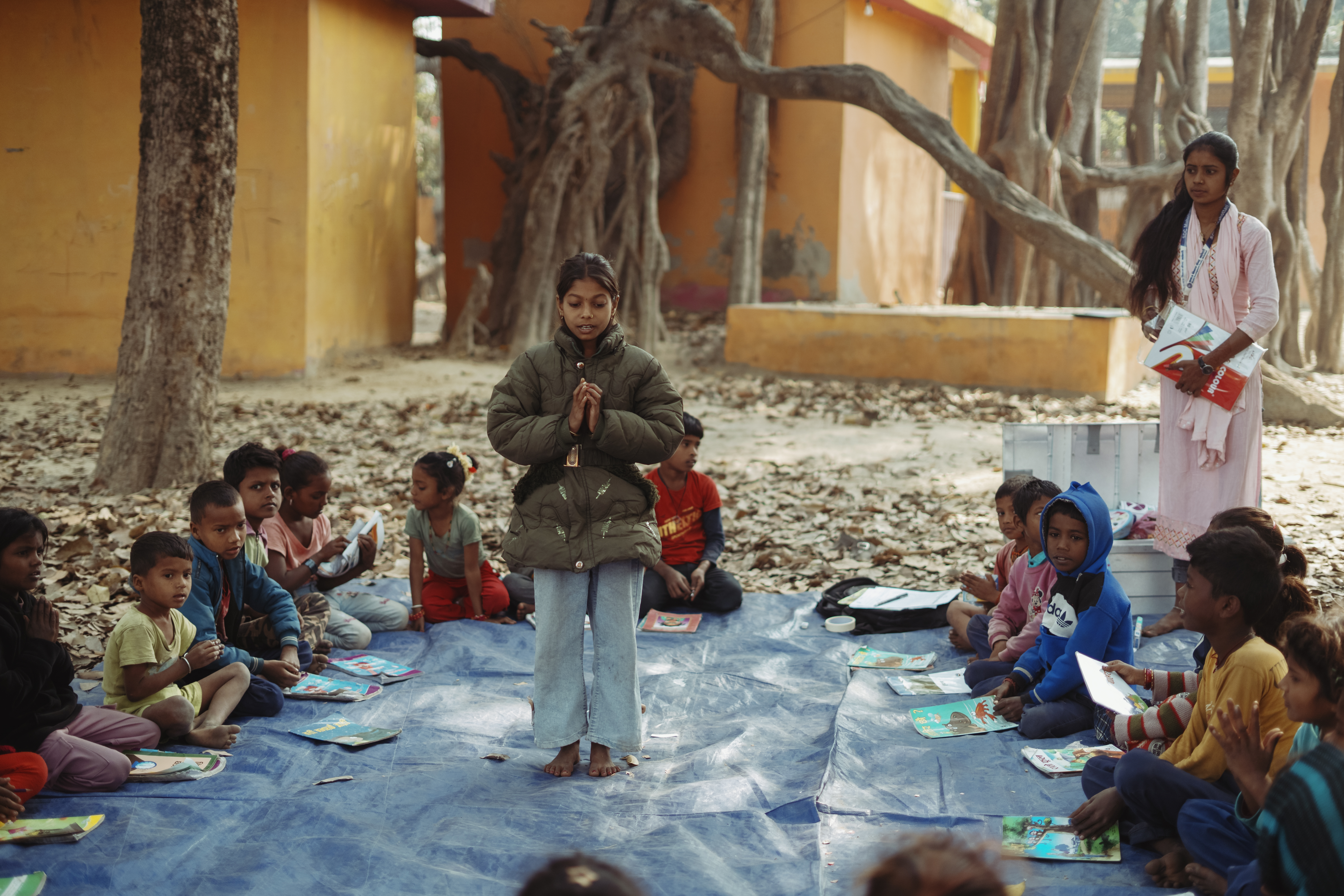
In total, 507 children (214 boys, 293 girls), along with 9 teachers and school staff (4 men, 5 women), now have access to a safe and inclusive learning environment, where they are enjoying studying in a joyful and enabling school setting. The project has notably improved the literacy skills of early-grade students. Qualitative data were gathered through Key Informant Interviews (KIIs) with the school headteacher, ward chairperson, and the Rural Municipality’s education coordinator. Focus Group Discussions (FGDs) were also conducted with parents of students in Grades 1 to 3, reading camp facilitators, teachers, and Eco Club members. Quantitatively, the Classroom-Based Early Grade Reading Assessment (CB-EGRA) was the primary tool used. The project’s endline evaluation showed a remarkable improvement in reading comprehension, rising from 32.7% at baseline to 63.5% at endline. Boys showed exceptional progress (from 30.7% to 73%), while girls also made solid gains (from 34.4% to 54.2%). These outcomes underscore the effectiveness of project-supported reading programs and interventions like reading camps, Unlock Literacy training for teachers, and the development of teaching and learning materials in enhancing early-grade literacy.
Overcoming Hurdles and Learning for the Future
Despite the successes, challenges were encountered. Insufficient land and related issues delayed the initiation of infrastructure construction, including school buildings, toilets, drinking water schemes, playgrounds, and especially boundary walls. Initial tree plantation efforts faced setbacks, as the open school area allowed local cattle to damage young trees, and the premises were vulnerable to troublemakers who stole or harmed plants in the absence of school representatives.
These challenges offered valuable lessons. Stakeholder engagement proved crucial for identifying community needs, aspirations, and potential areas of conflict. Addressing these issues before commencing activities proved effective in achieving project outcomes. Furthermore, ongoing advocacy and capacity building by community groups are essential to ensure continued government investment in school infrastructure and sustained community-level action for student learning even after the project concludes. Integrated efforts and resource sharing with the rural municipality and other partners were vital in filling resource gaps; for example, hand pump installation and play materials were supported by other organizations. Data-driven targeting, community mobilization, and resource concentration in specific areas have proven effective in achieving significant, holistic improvements in both the learning environment and educational outcomes.
Ensuring Lasting Change
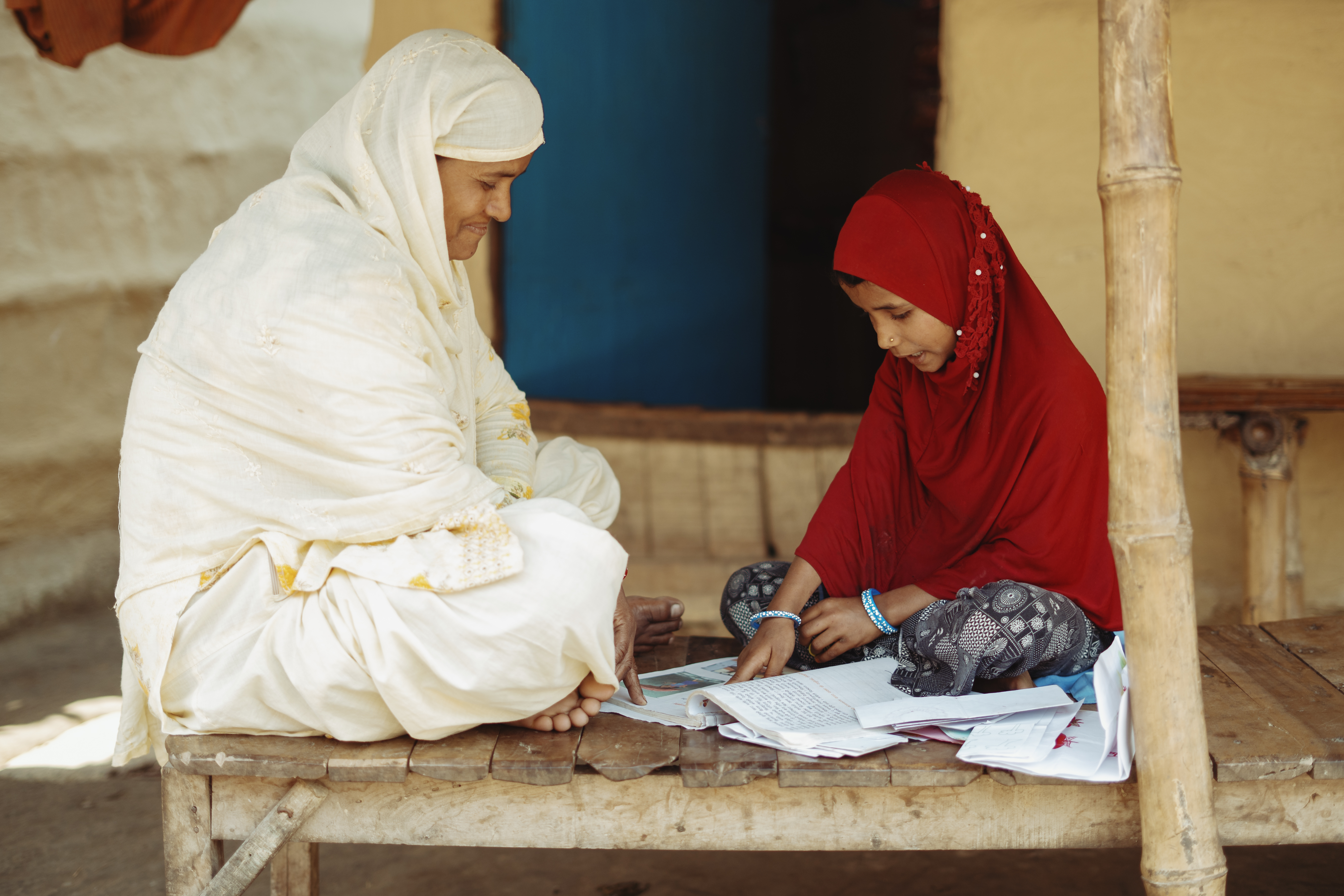
The sustainability of the Eco-School Project's impact is paramount. Engagement and ownership were fostered through active involvement of local government authorities, community leaders, and headteachers throughout the planning, consultations, and progress tracking phases. A formal handover ceremony upon project completion reinforced this commitment, attended by key dignitaries including the Minister of Education and Culture for Madhesh Province, Hon. Rani Kumari Tiwari, along with the Chairperson of Ekdara Rural Municipality, Dip Narayan Mandal, the ward chairperson, teachers, School Management Committee (SMC) members, and community members.
Key sustainability measures include:
- Partnership with Local Government: The project partnered with the local government and ward office to share resources and ensure holistic interventions. Local authorities played a key role in resolving emerging issues, clearing land, and improving community roads.
- Policy Endorsement: The Rural Municipality authorities and council officially endorsed the “Green School Program Implementation Procedure – 2082,” a policy that promotes a comprehensive and enabling green environment in schools.
- Capacity Strengthening: The project built local capacity by training teachers, creating an engaging learning environment, distributing plantation-related Information, Education, and Communication (IEC) materials, and raising parental awareness to support their children's education.
A Model for Holistic Educational Development
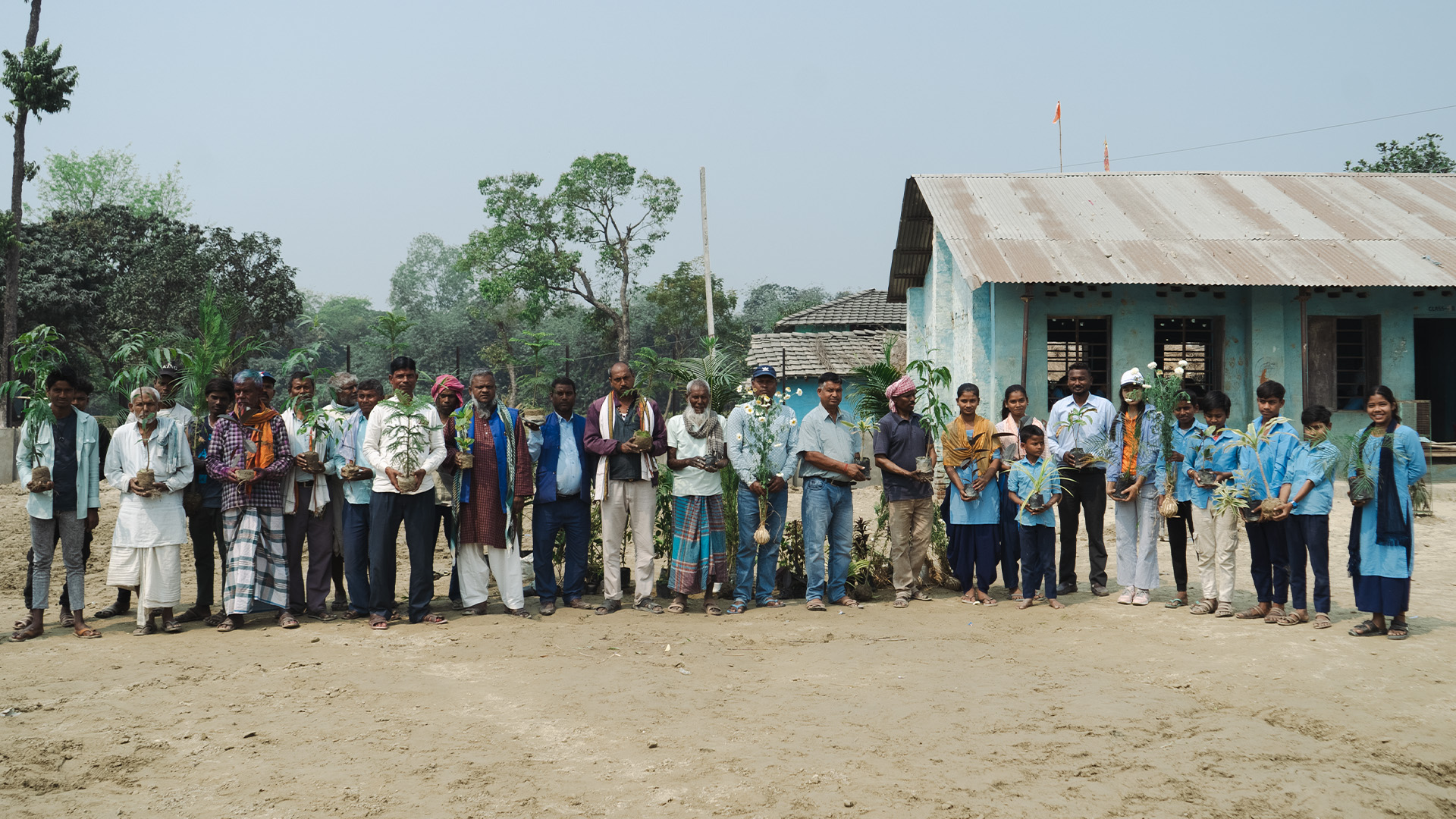
The Eco-School Project has proven its relevance and effective design by delivering significant improvements in the school environment, foundational literacy, and community engagement. It directly addressed critical needs in infrastructure, teaching capacity, and parental involvement at Shree Nepal Rastriya Basic School, aligning with local priorities without duplication. The project achieved substantial gains in foundational literacy, with a 94% increase from baseline in Eco-School-supported schools, despite socioeconomic challenges. This highlights the effectiveness of targeted interventions and early literacy prioritization for sustained gains. Implementation was efficient, showing high effectiveness in resource use and timely completion, driven by strategic partnerships and continuous stakeholder engagement.
Beyond academics, the project fostered safer, inclusive, and climate-resilient learning environments. It also shifted attitudes towards education, hygiene, climate action, and school governance among students, teachers, and the community, suggesting lasting benefits. In essence, the Eco-School Project significantly enhanced education quality in a vulnerable community. Sustaining these achievements requires continued investment in holistic, community-driven approaches, with robust planning, timely resource utilization, and post-construction support.
(References: Central Bureau of Statistics (CBS)/ National Population and Housing Census 2078 (2021), Project Proposal, Periodic Reports, Baseline and Evaluation Studies)
Writer: Hari Prasad Upadhyay (Field Programme Lead) | Editor: Binod Thapa Mager (Communications Specialist)